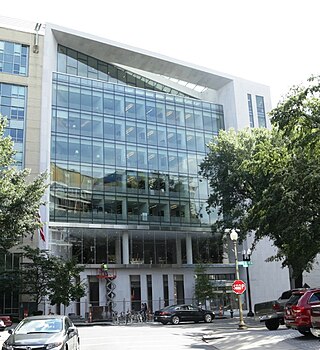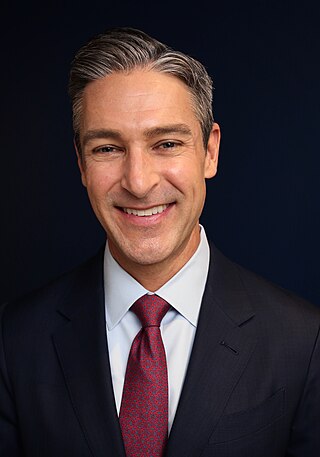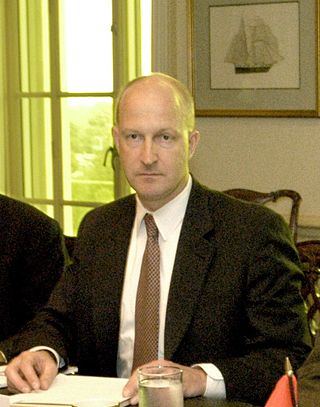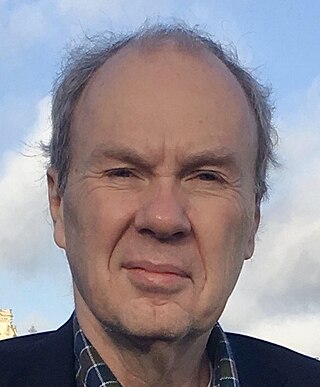
Henry Alfred Kissinger is a German-born American politician, diplomat, and geopolitical consultant who served as United States Secretary of State and National Security Advisor under the presidential administrations of Richard Nixon and Gerald Ford. A Jewish refugee who fled Nazi Germany with his family in 1938, Kissinger excelled academically, receiving his BA degree summa cum laude from Harvard College in 1950, studying under William Yandell Elliott. He received his MA and PhD degrees at Harvard University in 1951 and 1954, respectively. For his actions negotiating a ceasefire in Vietnam, Kissinger received the 1973 Nobel Peace Prize under controversial circumstances.

The Trilateral Commission is a nongovernmental international organization aimed at fostering closer cooperation between Japan, Western Europe and North America. It was founded in July 1973 principally by American banker and philanthropist David Rockefeller, an internationalist who sought to address the challenges posed by the growing economic and political interdependence between the U.S. and its allies in North America, Western Europe, and Japan.
Geopolitics is the study of the effects of Earth's geography on politics and international relations. While geopolitics usually refers to countries and relations between them, it may also focus on two other kinds of states: de facto independent states with limited international recognition and relations between sub-national geopolitical entities, such as the federated states that make up a federation, confederation, or a quasi-federal system.

The Council on Foreign Relations (CFR) is an American think tank specializing in U.S. foreign policy and international relations. Founded in 1921, it is a nonprofit organization that is independent and nonpartisan. CFR is based in New York City, with an additional office in Massachusetts. Its membership has included senior politicians, numerous secretaries of state, CIA directors, bankers, lawyers, professors, corporate directors and CEOs, and senior media figures.
The Atlantic Council is an American think tank in the field of international affairs, favoring Atlanticism, founded in 1961. It manages sixteen regional centers and functional programs related to international security and global economic prosperity. It is headquartered in Washington, D.C. It is a member of the Atlantic Treaty Association.

The Center for Strategic and International Studies (CSIS) is an American think tank based in Washington, D.C. CSIS was founded as the Center for Strategic and International Studies of Georgetown University in 1962. The center conducts policy studies and strategic analyses of political, economic and security issues throughout the world, with a specific focus on issues concerning international relations, trade, technology, finance, energy and geostrategy.
Aaron Louis Friedberg is an American political scientist. He served from 2003 to 2005 in the office of the Vice President of the United States as deputy assistant for national-security affairs and director of policy planning.
Geostrategy, a subfield of geopolitics, is a type of foreign policy guided principally by geographical factors as they inform, constrain, or affect political and military planning. As with all strategies, geostrategy is concerned with matching means to ends Strategy is as intertwined with geography as geography is with nationhood, or as Colin S. Gray and Geoffrey Sloan state it, "[geography is] the mother of strategy."

Ronald Anthony MarksFRSA is a former senior Central Intelligence Agency official and Capitol Hill Staffer. He is currently President of ZPN Cyber and National Security Strategies and an academic focused on Cyber and Intelligence policy issues. His book "Spying in America in the Post 9/11 World: Domestic Threat and the Need for Change," published by Praeger Publishing, focuses on the vast expansion of intelligence collection in America and the need for careful oversight.

Uzi Arad is an Israeli strategist and a well-known figure in foreign policy, security and strategic circles in Israel and abroad. He is a fellow at the Institute for National Security Studies (INSS) in Tel Aviv. Between 2009 and 2011 Arad served as the National Security Advisor to the Prime Minister of Israel, and the head of the Israeli National Security Council.
Francis J. Gavin is an American historian currently serving as the Giovanni Agnelli Distinguished Professor and Director of the Henry A. Kissinger Center for Global Affairs at Johns Hopkins University School of Advanced International Studies in Washington, D.C. He is also the chairman of the Board of Editors for the Texas National Security Review.

John Sitilides is a Washington, D.C. geopolitical strategist and diplomacy consultant to the U.S. Department of State.

The Schar School of Policy and Government, formerly known as the George Mason University School of Policy, Government, and International Affairs, is the public policy school of George Mason University headquartered in Arlington, Virginia roughly 4 miles (6.4 km) west of Washington, D.C., with a satellite campus in suburban Fairfax County, Virginia. Established in 2000 as Northern Virginia's first public policy school, the constituent college offers undergraduate and graduate degrees in international relations, public policy, public administration, political science, international security, and urban studies along with specialized graduate certificates, master's, and doctoral programs in fields such as biodefense, international commerce, homeland security, emergency management, counterterrorism, illicit trade analysis, organization development, and knowledge management as well as executive education programs with students eventually choosing one or two degree programs to join, but having the option of taking elective courses from across several of the aforementioned sub-fields at both the undergraduate and graduate levels. While it primarily educates and conducts research in subjects related to politics, government, international affairs, and public policy/public administration-related economics, as well as study of regional issues affecting the Washington D.C. metropolitan area, the school is home to several prominent centers and institutes, including the Michael V. Hayden Center for Intelligence, Policy, and International Security, the Center for Security Policy Studies, the Terrorism, Transnational Crime and Corruption Center (TraCCC), and the Center for Energy Science and Policy; the School of Policy and Government also cooperates with the Antonin Scalia Law School’s National Security Institute in conducting research around legal issues pertaining to national security. The school is also the psephology partner of The Washington Post, collaborating on electoral polling and analysis for the paper since 2016, the two hold an A+ rating for historical accuracy and methodology in polling from FiveThirtyEight.

The Center for Strategic Studies under the President of the Republic of Azerbaijan (SAM) is Azerbaijan’s first governmental, non-profit think tank founded on November 12, 2007 by the Decree of the President, Ilham Aliyev. Its headquarters is in Baku, Azerbaijan. In February 2008, by the Decree of the President of the Republic of Azerbaijan, Elkhan Nuriyev was appointed director of the Center for Strategic Studies, known by the acronym SAM in Azerbaijani language.

Damon M. Wilson is an American foreign policy expert and the President and CEO of the National Endowment for Democracy, an independent grant-making foundation supporting freedom and democracy around the world. From 2011 to 2021, he was the Executive Vice President at the Atlantic Council, a nonpartisan think tank focused on international cooperation. A former civil servant, Wilson served as Special Assistant to the President and Senior Director for European Affairs at the National Security Council during the second term of President George W. Bush.

Ian Joseph Brzezinski is an American foreign policy and military affairs expert.

The Kissinger Institute on China and the United States is a non-profit research organization dedicated to promoting greater understanding of issues in the relationship between the People's Republic of China and the United States and its impact on both countries and the world. It was inaugurated in 2008 and is part of the Woodrow Wilson International Center for Scholars. Its current director is Robert Daly.

Mathew James Burrows is an American intelligence and strategic foresight expert and author.

The Michael V. Hayden Center for Intelligence, Policy, and International Security is a think tank in Arlington, Virginia focused on the intelligence community including topics related to intelligence studies education, intelligence analysis techniques, and the operations of intelligence agencies, as well as national security policy through shared experiences of senior intelligence service leaders, military officers, elected officials, journalists, and academics. It is housed within the Schar School of Policy and Government but also cooperates with the Antonin Scalia Law School’s National Security Institute in conducting research around legal issues pertaining to national security; both of which are affiliated with George Mason University.
Janne E. Nolan was an American academic, foreign policy advisor, and expert on nuclear arms control and nonproliferation. She held senior positions in the Department of State, as a staffer for the Senate, and served on multiple blue ribbon commissions. She was well known for supporting generations of women in the traditionally male dominated field of nuclear security.














